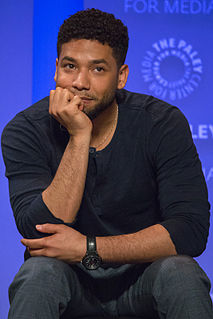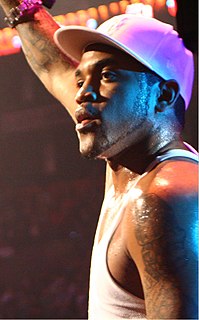A Quote by Russell Simmons
I think the rap community always tells the truth. And I think that it's important that we listen to their voices so we can have a roadmap, because artists - almost every single artist in hip-hop, they paint a picture of society that's overlooked. The misogyny, the racism, the violence, the homophobia, these are things that we try to avoid instead of dealing with. All of that I see it so often.
Related Quotes
I think that's one thing that hinders hip-hop and I think when everybody tries to be the same... That's why people look at the 1990s almost like it was a golden era in hip-hop 'cause it was so much diversity in the music and in the artists. It wasn't everybody just trying to paint the same picture and say it with the same flow.
Hip-hop is contributing to American society's misogyny and racism, hyper-sexuality anti-Black representations. Hip-Hop isn't setting the standard for misogyny. No one reduces the presidency to misogyny, although we've had misogynistic presidents. No one reduces our government to being solely homophobic, although we have a government with a don't ask, don't tell policy for gays and lesbians in the military.
To be honest, that whole exchange with Crunk Feminist actually made me write the song because I realize there's a lot of young women out there so hurt by the misogynistic images in hip-hop they paint it with such a broad brush stroke that they think anybody that defends hip-hop is defending misogyny.
In this time, we incorporate money and media, and it's split up like apartheid, where when you say "hip-hop," you think just rap records. People might have forgot about all the other elements in hip-hop. Now we're back out there again, trying to get people back to the fifth element, the knowledge. To know to respect the whole culture, especially to you radio stations that claim to be hip-hop and you're not, because if you was a hip-hop radio station, why do you just play one aspect of hip-hop and rap, which is gangsta rap?
Quentin Tarantino is a hip-hop artist. I told him, 'You're hip-hop!' You keep seeing surprises, and a clip here and there, because Quentin is hip-hop. A hip-hop artist will drop a single, leak something over here, and drop something over there 'cause he knows it's hot. He's on the spot with the way he does things.
Quentin Tarantino is a hip-hop artist. I told him, "You're hip-hop!" You keep seeing surprises, and a clip here and there, because Quentin is hip-hop. A hip-hop artist will drop a single, leak something over here, and drop something over there 'cause he knows it's hot. He's on the spot with the way he does things.
If you want to speak about different ethnicities and diversity, rap and hip-hop are all over the planet. Every country, from Turkey to Australia, now has tons of hip-hop artists. The music and artistry have moved way faster than the corporatization of the music. You do need organization and opportunity for these artists to express themselves, and I don't think it has to come from a corporate co-signing.
I think there are so many children being brought up in some form of violence, be it violence of poverty or sexism or racism or homophobia or transphobia. That violence takes a life to transform or overcome. I don't think people should be spending their lives dealing with that. I think people should be thriving, playing, creating, evolving.
I think that hip-hop should be spelled with a capital "H," and as one word. It's the name of the culture, and it's the name of the identity and consciousness. I think hip-hop is not a product, but a culture. I think rap is a product, but when hip-hop becomes a product, that's slavery, because you're talking about people's souls.
To me, that's the biggest problem with hip-hop today is the fact that everyone believes that all of hip-hop is rap music, and that, when you say "hip-hop," it's synonymous with rap. That when you say "hip-hop," you should be thinking about breakdancing, graffiti art, or MCing - which is the proper name for rap - DJing, beat-boxing, language, fashion, knowledge, trade. You should be thinking about a culture when you say, "hip-hop.".
I think that hip-hop should be spelled with a capital "H," and as one word. It's the name of our black people culture, and it's the name of our identity and consciousness. I think hip-hop is not a product, but a culture. I think rap is a product, but when hip-hop becomes a product, that's slavery, because you're talking about people's souls. To me, that's the biggest problem.































